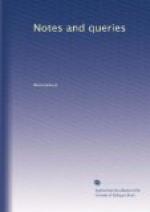The Editor has a note on this letter:—
“There have been various conjectures relative to the origin of this custom. Some have supposed that it arose from an ancient practice among the friars of selling consecrated salt and others, with more probability, from the ceremony of the bairn or boy-bishop, as it is said to have been formerly a part of the Montem-celebration for prayers to be read by a boy dressed in the clerical habit.”
A letter from Dr. Tanner to Mr. Hearne on Barne or Boy-bishops, is in vol. i., p. 302.
2. The Turkish Spy (Vol. i., p. 324.; vol. ii., p. 12.).—The letter or the authorship of this work quoted by DR. RIMBAULT from the Bodleian MSS., is printed in vol. i. p. 233.; and I observe that DR. R. has incorporated in his communication the Editor’s note on the passage.
3. Dr. Dee (Vol. i., pp. 216. 284.).—A letter about Dr. Dee from Mr. Ballard to T. Hearne occurs in vol. ii. p. 89. It does not throw light on the question of why Dr. Dee left Manchester College? There are also notes for a life of Dee among Aubrey’s Lives, appended to these Letters (vol. ii. p. 310.) Both letters and notes refer to original sources of information for Dee’s Life.
CH.
* * * * *
MINOR NOTES.
Alarm.—A man is indicted for striking at the Queen, with intent (among other things) to alarm her Majesty. It turns out that the very judge has forgotten the legal (which is also the military) meaning of the word. An alarm is originally the signal to arm: Query, Is it not formed from the cry a l’arme, which in modern times is aux armes? The judge said that from the courage of her family, most likely the Queen was not alarmed, meaning, not frightened. But the illegal intent to alarm merely means the intent to make another think that it is necessary to take measures of defence or protection. When an alarm is sounded, the soldier who is not alarmed is the one who would be held to be frightened.




